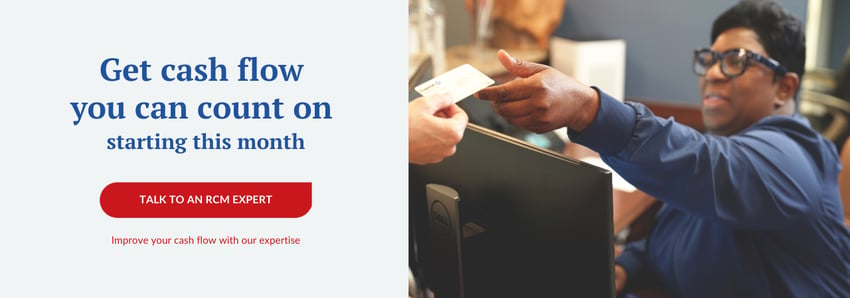How DSOs meet 3 top challenges with revenue cycle management services: 3 problems and solutions


As the leader at your dental business, you’re looking to take your DSO’s performance to the next level. But growth comes with a number of challenges, especially for emerging DSOs. These challenges include:
- Finding staff with the right skills and experience
- Ability to standardize operations, especially for revenue collection
- Making optimal use of technology
You want to increase your revenue, manage your operations, and grow your DSO. But these challenges stand in the way of future financial and professional development.
How can you face these growth challenges while successfully serving dental offices?
Dental businesses can find a faster, easier path to financial health by leveraging the skills and resources of an RCM service provider.
DCS offers revenue cycle management services that contribute needed knowledge, experience, and human resources.
The potential of DSOs is limited by challenges such as staffing shortages, the ability to streamline processes, and the use of modern technology.
In this article, we’re sharing 3 business challenges DSOs face, and how revenue cycle management services provide solutions to each of them.
What is revenue cycle management?
Revenue cycle management (RCM) is the process of overseeing the interrelated steps involved in generating and collecting patient service revenue.
The revenue cycle encompasses all the steps involved in providing patient services and obtaining payment. The revenue cycle begins with the marketing that prompts the patient to schedule dental care, through to the last financial transaction.
If you’re thinking of the revenue cycle in terms of a dental business, it typically includes:
- Credentialing
- Insurance verification
- Insurance billing
- Patient billing
- Payment posting
- Reporting and monitoring
We know that both RCM and private practice administrators do similar work, but use different vocabulary. Many office managers look at payment collection as a set of tasks, often as separate jobs.
Revenue cycle management takes an end-to-end approach, looking at how each process impacts the financial health of the whole. RCM addresses all the processes and how they work together to generate and collect revenue for the dental business.
So, how can using an RCM service help dental businesses meet 3 current challenges?
1. Staffing challenges: Finding people for admin positions with needed skills
According to this ADA poll, 70% of dentists say recruiting administrative staff has been very or extremely challenging.
And this isn’t limited to just individual private practices. DSOs have seen fallout from staffing challenges as well. “DSOs need better candidates with more billing experience,” says DCS RCM Director, Shannon Peterson.
It’s not just about filling positions, it’s about finding people with the expertise in dental billing who can do the job correctly.
Dental billing requires a combination of insurance claims knowledge, attention to detail, strong organizational skills, clear communication, and frequent adaptation to change.
The pool of people with these specialized skills and experience is limited. Training for dental insurance billing isn’t standardized, adding to the challenge to find people with the knowledge to be effective.
“An overall, streamlined and clearly defined dental billing system must be adopted by the entire organization and implemented at each individual practice. One issue is that many people are just learning the mechanics and fundamentals of dental billing.” - Group Dentistry Now
You want someone who already knows the mechanics and fundamentals of dental billing.
How DSOs meet staffing challenges with a dental RCM service partner
With revenue cycle management services, you won’t have to spend time and resources finding the right candidates for your DSO.
Staffing and training is the service provider’s responsibility. The RCM provider manages the experts who do the work. The provider should ensure claims processing goes to vetted billers who have been rigorously trained and are knowledgeable about dental insurance, including:
- Dental billing best practices (claim submission, claim appeals, payment posting)
- Reporting
- Coding
- Insurance rules and regulations by state
Furthermore, a good RCM provider maximizes the effectiveness of its employees. At DCS, billing experts are able to collaborate to create a pool of knowledge they can access: each other.
The ability to tap the expertise of fellow dental billers gives your DSO the benefit of more extensive dental billing knowledge.
Dental practices can reduce staffing challenges by partnering with a provider which does its own recruiting, training and optimization. You don’t have to search high and low for people to fill positions and perform at a high level.

2. Need for standardized operations, especially for revenue collection
It’s challenging when each dental office that joins your group comes in with a different way of doing things. You want standardized processes across the board that will work for every office. Standard operating procedures are necessary to manage effectively and to scale growth.
This article from Planet DDS explains it perfectly: “You cannot manage your DSO like a private dental practice. You have to adopt a franchise model to handle all the moving parts. It is just too difficult to manage multiple offices that all have different daily operations.”
But how do you create and implement operations that will lead to revenue collection across the board?
You’ve got 2 options:
1. Create procedures, staff and train people to perform them correctly.OR
2. Partner with an RCM service that has established procedures and training protocols.How DSOs easily standardize operations with a dental RCM service partner
Revenue cycle management services work with your DSO to make every part of dental practices’ revenue cycle as efficient as possible. When you have billing experts working on your dental business’ revenue cycle, it will be more organized because seasoned billers know to stay up to date on best practices.
Areas they standardize:
- Insurance verification
- Patient billing
- Insurance billing and posting
The billers will see where the deficiencies are by analyzing financial reports in dental practices’ PMS software. From there, they will take steps to fill in the gaps and make way for more efficient processes.
Related: Why a profitable dental revenue cycle depends on a good billing process
And these processes are regularly updated based on the changes of the dental industry landscape. Some dental businesses haven’t updated their processes or operations in years.
“It has been easy to overlook inefficient RCM practices given the local, low-volume nature of activity. As a result, processes associated with billing and reimbursement have, in many cases, remained largely unchanged for decades.” - Group Dentistry Now
To be competitive, RCM service providers must continuously evolve and improve processes, not stay stuck in the “old ways.” They also take advantage of technology to help improve accuracy and efficiency. Let’s get into that next.
-1.jpg?width=620&height=413&name=DSC00906%20(2)-1.jpg)
3. Operational Challenges: to use diverse and changing technology
DSOs and individual dental practices alike struggle to optimize the use of modern technology. And with technology changing so quickly, this challenge is ongoing.
Each office has its own practice management software (PMS). Understanding how to use multiple different PMS systems requires a high level of expertise.
There also isn’t a simple software solution that allows revenue cycle managers to oversee all the data from all the members.
Related: 5 tech tools to get the best from your dental billing service
In general, DSO leaders want better technology to manage growing numbers of dental practices, but the time, resources it takes to innovate can present a challenge.
Larger DSOs are finding themselves operating like tech companies, constantly developing solutions to manage member data on a large scale.
But what about emerging DSOs, who are just starting to acquire practices? What can they do to optimize their use of technology to grow and increase revenue?
RCM services help DSOs overcome the challenge of using diverse and changing technology
Your management team will see faster and more accurate results by leveraging an RCM service’s experience using modern technology.
To better serve dental businesses, RCM services integrate existing tools such as:
- Automated patient billing technology
- Technology-assisted verification for quick and easy insurance verification
- Expertise in the best cloud-based practice management software
RCM services continue to evolve their use of technology to reduce human error and manual busy work, so that dental professionals can focus on patient care.
But how can RCM services serve DSOs when technology is constantly changing and every practice uses different technology?
- Integration: RCM services integrate with multiple dental technology platforms and software, ensuring that all the data is consolidated into one centralized system for easy access and analysis.
- Data Management: RCM services can help manage and analyze data from dental technologies, such as patient information, billing and insurance information, appointment schedules, and more.
- Insurance Claims Processing: RCM services can streamline the claims processing process by integrating with PMS and submitting claims electronically, reducing the risk of denied claims.
- Billing and Collections: RCM services can assist with billing and collections by using data from dental technologies to generate accurate invoices and ensure that payments are collected in a timely manner.
- Reporting: RCM services can provide real-time reporting and analytics, providing insights into various aspects of the revenue cycle, including:
- Patient demographics
- Insurance coverage
- Payment patterns, and more.
Use of technology like this helps you manage diverse and changing tools to serve multiple dental practices efficiently at your DSO.
Elevate your emerging DSO by using revenue cycle management services
By overcoming staffing shortages and lack of expertise on billing processes and technology, your DSO will thrive, becoming competitive and profitable.
With revenue cycle management services, these challenges are overcome efficiently and accurately. You will have access to seasoned billing experts, see a transformation of operations and processes, and elevate your DSO through automated technology.
Revenue cycle management services are a resource for DSOs to use to better serve their dental practices. This means collecting more for them, so that their in-house team can worry less. And you can focus on your DSO’s continued growth. Schedule a call with DCS to learn more.
Related Posts
Dental revenue resources from Dental Claim Support

